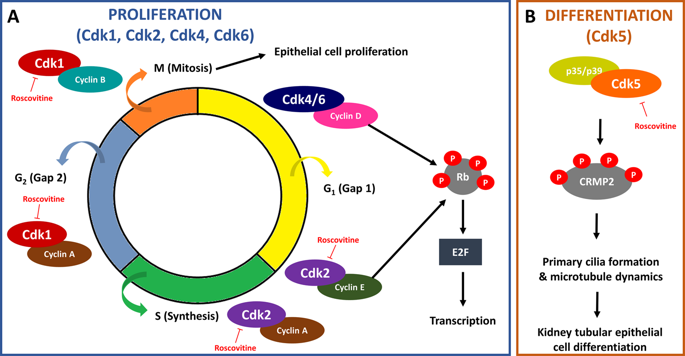Laboratory Investigation ( IF 5.1 ) Pub Date : 2020-01-08 , DOI: 10.1038/s41374-019-0360-4 Jennifer Qin Jing Zhang 1, 2 , Jane Burgess 1, 2 , Daria Stepanova 1, 2 , Sayanthooran Saravanabavan 1, 2 , Annette T Y Wong 1, 2 , Philipp Kaldis 3, 4 , Gopala K Rangan 1, 2

|
A hallmark of polycystic kidney diseases (PKDs) is aberrant proliferation, which leads to the formation and growth of renal cysts. Proliferation is mediated by cyclin-dependent kinases (Cdks), and the administration of roscovitine (a pan-Cdk inhibitor) attenuates renal cystic disease in juvenile cystic kidney (jck) mice. Cdk2 is a key regulator of cell proliferation, but its specific role in PKD remains unknown. The aim of this study was to test the hypothesis that Cdk2 deficiency reduces renal cyst growth in PKD. Three studies were undertaken: (i) a time course (days 28, 56, and 84) of cyclin and Cdk activity was examined in jck mice and compared with wild-type mice; (ii) the progression was compared in jck mice with or without Cdk2 ablation from birth; and (iii) the effect of sirolimus (an antiproliferative agent) on Cdk2 activity in jck mice was investigated. Renal disease in jck mice was characterized by diffuse tubular cyst growth, interstitial inflammation and fibrosis, and renal impairment, peaking on day 84. Renal cell proliferation peaked during earlier stages of disease (days 28–56), whereas the expression of Cdk2-cyclin partners (A and E) and Cdk1 and 2 activity, was maximal in the later stages of disease (days 56–84). Cdk2 ablation did not attenuate renal disease progression and was associated with persistent Cdk1 activity. In contrast, the postnatal treatment of jck mice with sirolimus reduced both Cdk2 and Cdk1 activity and reduced renal cyst growth. In conclusion, (i) the kinetics of Cdk2 and Cdk2-cyclin partners did not correlate with proliferation in jck mice; and (ii) the absence of Cdk2 did not alter renal cyst growth, most likely due to compensation by Cdk1. Taken together, these data suggest that Cdk2 is dispensable for the proliferation of cystic epithelial cells and progression of PKD.
中文翻译:

细胞周期蛋白依赖性激酶 2 在小鼠幼年囊性肾病进展中的作用
多囊肾病 (PKD) 的一个标志是异常增殖,这会导致肾囊肿的形成和生长。增殖由细胞周期蛋白依赖性激酶 (Cdks) 介导,施用 roscovitine(一种泛 Cdk 抑制剂)可减轻幼年囊性肾 ( jck ) 小鼠的肾囊性病。Cdk2是细胞增殖的关键调节因子,但其在 PKD 中的具体作用仍然未知。本研究的目的是检验Cdk2缺乏减少 PKD 肾囊肿生长的假设。进行了三项研究:(i) 在jck小鼠中检查细胞周期蛋白和 Cdk 活性的时间进程(第 28、56 和 84 天)并与野生型小鼠进行比较;(ii) 在jck中比较了进展出生时有或没有Cdk2消融的小鼠;(iii)研究了西罗莫司(一种抗增殖剂)对jck小鼠Cdk2活性的影响。jck小鼠肾脏疾病的特征是弥漫性肾小管囊肿生长、间质炎症和纤维化以及肾功能损害,在第 84 天达到峰值。肾细胞增殖在疾病的早期阶段(第 28-56 天)达到峰值,而 Cdk2-细胞周期蛋白的表达伙伴(A 和 E)以及Cdk1和2活性在疾病后期(第 56-84 天)达到最大。Cdk2消融并没有减弱肾脏疾病的进展,并且与持续的Cdk1活动。相比之下,用西罗莫司对jck小鼠进行产后治疗降低了Cdk2和Cdk1 的活性,并减少了肾囊肿的生长。总之,(i) Cdk2和Cdk2 -细胞周期蛋白伴侣的动力学与jck小鼠的增殖无关;(ii) Cdk2的缺失不会改变肾囊肿的生长,这很可能是由于Cdk1的补偿。总之,这些数据表明Cdk2对于囊性上皮细胞的增殖和 PKD 的进展是可有可无的。









































 京公网安备 11010802027423号
京公网安备 11010802027423号